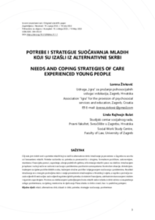Abstract:
The main aim of this paper is to gain insight into the needs of youth who have left alternative care in the social welfare system. The study was conducted in Zagreb on a sample of sixteen young people. The needs of the study participants are: the need for contact with others, formal support, autonomy, housing and financial support, employment, learning practical skills, access to information, and the right to benefits such as (financial) relief. It has also been examined how participants cope with problems: positive self-direction and control of the situation, distraction, seeking social support from significant others, seeking professional support, and avoiding problems.
The results of this research are consistent with previous research in Croatia and around the world in many areas, especially in the area of unsatisfied or insufficiently satisfied existential needs: sufficient financial resources, adequate housing, and a stable and secure job. Opportunities to facilitate and improve the lives of young people after leaving alternative care are seen in the improvement of post-treatment services, social mentoring, and the creation of the "Plan for leaving alternative care" and its practical implementation.
Sažetak:
Cilj rada jest dobiti uvid u potrebe mladih koji su izašli iz alternativne skrbi. Istraživanje je provedeno u Zagrebu na uzorku od šesnaestero mladih. Potrebe sudionika su: potreba za povezanošću s drugima, formalnom podrškom, autonomijom, stambena i financijska pomoć, zaposlenje, učenje praktičnih vještina, informiranje mladih i pravo na olakšice. Istraživanjem je ispitano i na koji način se sudionici suočavaju s problemima: pozitivnim samouputama i kontrolom situacije, distrakcijom, traženjem socijalne podrške bliskih osoba, traženjem stručne podrške i izbjegavanjem suočavanja s problemima. Rezultati istraživanja se u mnogim područjima slažu s ranije provedenim istraživanjima u Hrvatskoj i svijetu, a najviše u području nezadovoljenih ili nedovoljno zadovoljenih egzistencijalnih potreba: dostatnim financijama, adekvatnim stanovanjem i stalnim i sigurnim zaposlenjem. Prostora za olakšavanjem i poboljšanjem života mladih nakon izlaska iz skrbi vidimo u unapređenju usluge posttretmana, socijalnog mentorstva te djelovanju Plana izlaska iz skrbi u izradi, kao i u praktičnoj primjeni.

